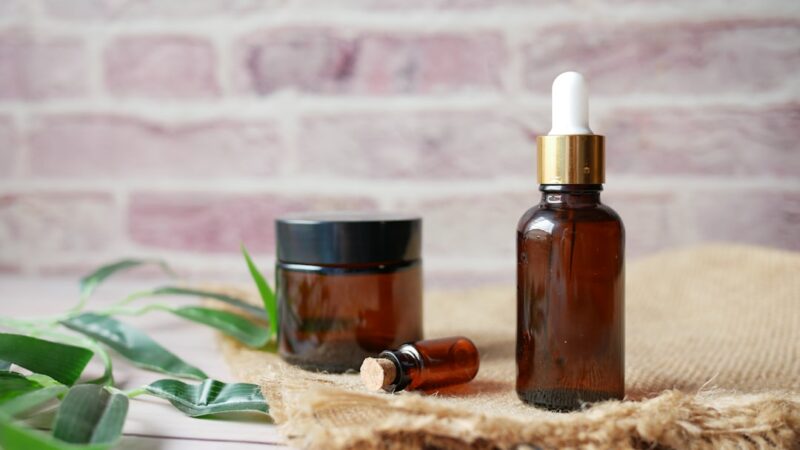Gluten-Free Cosmetics for People with Celiac Disease

Celiac disease is an autoimmune disorder that affects the small intestine and is triggered by the consumption of gluten, a protein found in wheat, barley, and rye. Gluten sensitivity, also known as non-celiac gluten sensitivity, is a condition in which individuals experience symptoms similar to those with celiac disease but do not have the same immune response. Both celiac disease and gluten sensitivity require strict adherence to a gluten-free diet to avoid symptoms and potential long-term complications.
While most people are aware of the importance of avoiding gluten in their diet, many may not realize that gluten can also be found in cosmetics and personal care products. For individuals with celiac disease or gluten sensitivity, using gluten-free cosmetics is crucial to prevent accidental ingestion or absorption of gluten through the skin.
Table of Contents
Key Takeaways
- Celiac disease and gluten sensitivity can cause adverse reactions to gluten in cosmetics.
- Gluten-free cosmetics are important for people with celiac disease to avoid skin irritation and other symptoms.
- Common ingredients to avoid in cosmetics for celiac patients include wheat, barley, and rye.
- There are many gluten-free makeup brands available for sensitive skin, including Bare Minerals and Tarte.
- Reading cosmetic labels carefully is crucial for identifying gluten-free ingredients and avoiding potential allergens.
Understanding Celiac Disease and Gluten Sensitivity
Celiac disease is an autoimmune disorder in which the body’s immune system mistakenly attacks the lining of the small intestine when gluten is consumed. This immune response leads to inflammation and damage to the villi, tiny finger-like projections that line the small intestine and are responsible for nutrient absorption. Symptoms of celiac disease can vary widely and may include digestive issues such as diarrhea, bloating, and abdominal pain, as well as fatigue, weight loss, and nutrient deficiencies.
Gluten sensitivity, on the other hand, is a condition in which individuals experience symptoms similar to those with celiac disease but do not have the same immune response or intestinal damage. Symptoms of gluten sensitivity can include digestive issues, headaches, joint pain, skin problems, and brain fog. While the exact cause of gluten sensitivity is not fully understood, it is believed to involve an immune response and inflammation in some individuals.
Both celiac disease and gluten sensitivity require a strict gluten-free diet to manage symptoms and prevent long-term complications. This means avoiding all sources of gluten, including foods, beverages, medications, and even cosmetics.
The Importance of Gluten-Free Cosmetics for People with Celiac Disease
While the primary route of gluten exposure for individuals with celiac disease or gluten sensitivity is through ingestion, gluten can also be absorbed through the skin. The skin is the body’s largest organ and can absorb certain substances, including gluten, into the bloodstream. This means that using cosmetics or personal care products that contain gluten can potentially lead to gluten exposure and trigger symptoms in individuals with celiac disease or gluten sensitivity.
The risks of using cosmetics with gluten for celiac patients are twofold. First, there is the risk of accidental ingestion if gluten-containing cosmetics come into contact with the mouth or are applied to the lips. Second, there is the risk of skin absorption, which can lead to systemic exposure to gluten and potential symptoms.
Using gluten-free cosmetics is essential for individuals with celiac disease or gluten sensitivity to avoid these risks. By choosing gluten-free cosmetics, individuals can ensure that they are not inadvertently exposing themselves to gluten and can maintain a strict gluten-free lifestyle.
Common Ingredients to Avoid in Cosmetics for Celiac Patients
When it comes to choosing gluten-free cosmetics, it is important to be aware of common ingredients that may contain gluten. Some common ingredients to avoid in cosmetics for celiac patients include:
1. Wheat-derived ingredients: Look out for ingredients such as wheat germ oil, wheat protein, hydrolyzed wheat protein, and wheat amino acids.
2. Barley-derived ingredients: Barley extract, barley flour, and barley seed extract are examples of ingredients that may contain gluten.
3. Rye-derived ingredients: Rye flour and rye seed extract are potential sources of gluten in cosmetics.
4. Oats: While oats themselves do not contain gluten, they are often cross-contaminated with gluten during processing. Look for products that specifically state they are made with certified gluten-free oats.
5. Triticum vulgare: This is the scientific name for wheat and may be listed on ingredient labels.
It is important to note that gluten can also be found in other ingredients that are not derived from wheat, barley, or rye. For example, some cosmetic products may contain hydrolyzed vegetable protein, which can be derived from gluten-containing grains. It is always best to look for products that are specifically labeled as gluten-free to ensure they are safe for individuals with celiac disease or gluten sensitivity.
Gluten-Free Makeup Brands for Sensitive Skin
Fortunately, there are many makeup brands that offer gluten-free options for individuals with sensitive skin or celiac disease. Some popular gluten-free makeup brands include:
1. bareMinerals: This brand offers a wide range of gluten-free makeup products, including foundation, blush, eyeshadow, and lipstick.
2. Tarte Cosmetics: Tarte is known for its high-quality, gluten-free makeup products. Their range includes foundations, concealers, mascaras, and lipsticks.
3. Pacifica: Pacifica offers a variety of gluten-free makeup products made with natural ingredients. Their range includes foundations, eyeshadows, and lipsticks.
4. E.L.F. Cosmetics: E.L.F. is a budget-friendly brand that offers a range of gluten-free makeup options, including foundations, powders, and eyeshadows.
Using gluten-free makeup can be beneficial for individuals with sensitive skin as well. Many people with celiac disease or gluten sensitivity also have other skin conditions such as eczema or dermatitis, which can be aggravated by gluten-containing cosmetics. By choosing gluten-free makeup brands, individuals can reduce the risk of skin irritation and maintain healthy skin.
How to Read Cosmetic Labels for Gluten-Free Ingredients

Reading cosmetic labels for gluten-free ingredients can be challenging as gluten can be hidden under different names. Here are some tips for reading cosmetic labels to identify gluten-free ingredients:
1. Look for products labeled as gluten-free: Many cosmetic brands now label their products as gluten-free, making it easier for individuals with celiac disease or gluten sensitivity to find safe options.
2. Avoid ingredients derived from wheat, barley, or rye: As mentioned earlier, ingredients such as wheat germ oil, barley extract, and rye flour should be avoided.
3. Be cautious of cross-contamination: Even if a product does not contain gluten-containing ingredients, it may still be at risk of cross-contamination during manufacturing. Look for products that are specifically labeled as “certified gluten-free” to ensure they are safe.
4. Familiarize yourself with alternative names for gluten-containing ingredients: Gluten can be listed under various names, such as hydrolyzed vegetable protein or triticum vulgare. It is important to be aware of these alternative names and avoid them if you have celiac disease or gluten sensitivity.
Gluten-Free Skincare Products for Celiac Patients
In addition to makeup, individuals with celiac disease or gluten sensitivity should also be mindful of the skincare products they use. Many skincare products, such as moisturizers, cleansers, and serums, can contain gluten-derived ingredients that can potentially be absorbed through the skin.
Fortunately, there are many gluten-free skincare products available for individuals with celiac disease or gluten sensitivity. Some popular gluten-free skincare brands include:
1. CeraVe: CeraVe offers a range of gluten-free skincare products that are gentle and suitable for sensitive skin. Their products include cleansers, moisturizers, and serums.
2. Aveeno: Aveeno is known for its natural and gentle skincare products. They offer a variety of gluten-free options, including moisturizers, body washes, and sunscreens.
3. La Roche-Posay: La Roche-Posay is a dermatologist-recommended brand that offers gluten-free skincare products for sensitive skin. Their range includes cleansers, moisturizers, and sunscreens.
Using gluten-free skincare products can help individuals with celiac disease or gluten sensitivity maintain healthy skin and avoid potential reactions or flare-ups.
Gluten-Free Hair Care Products for Celiac Patients
Hair care products, such as shampoos, conditioners, and styling products, can also contain gluten-derived ingredients. These products can come into contact with the scalp and hair, potentially leading to absorption of gluten through the skin.
To avoid this risk, individuals with celiac disease or gluten sensitivity should opt for gluten-free hair care products. Some popular gluten-free hair care brands include:
1. OGX: OGX offers a range of gluten-free hair care products that are free from sulfates and parabens. Their products include shampoos, conditioners, and styling products.
2. Desert Essence: Desert Essence is a natural hair care brand that offers gluten-free options. Their range includes shampoos, conditioners, and hair oils.
3. Acure: Acure is a vegan and gluten-free hair care brand that offers a variety of products for different hair types. Their range includes shampoos, conditioners, and hair masks.
Using gluten-free hair care products can help individuals with celiac disease or gluten sensitivity maintain healthy hair and scalp without the risk of gluten exposure.
Gluten-Free Nail Polish and Nail Care Products for Celiac Patients
Nail polish and nail care products can also contain gluten-derived ingredients, which can potentially be absorbed through the nails and cuticles. To avoid this risk, individuals with celiac disease or gluten sensitivity should choose gluten-free nail polish and nail care products.
Some popular gluten-free nail polish brands include:
1. Zoya: Zoya is a well-known brand that offers a wide range of gluten-free nail polishes in various colors and finishes.
2. Ella+Mila: Ella+Mila is a vegan and gluten-free nail polish brand that offers a variety of shades and finishes.
3. Pacifica: Pacifica offers gluten-free nail polishes that are made with natural ingredients and come in a range of colors.
Using gluten-free nail polish and nail care products can help individuals with celiac disease or gluten sensitivity maintain beautiful nails without the risk of gluten exposure.
Gluten-Free Fragrances for Celiac Patients
Fragrances, including perfumes, colognes, and body sprays, can also contain gluten-derived ingredients. These products can come into contact with the skin and potentially lead to absorption of gluten.
To avoid this risk, individuals with celiac disease or gluten sensitivity should choose gluten-free fragrances. Some popular gluten-free fragrance brands include:
1. Pacifica: Pacifica offers a range of gluten-free fragrances made with natural ingredients. Their fragrances come in various scents, including floral, fruity, and woody.
2. Lavanila: Lavanila is a brand that offers gluten-free fragrances made with natural and organic ingredients. Their fragrances are free from harsh chemicals and come in a variety of scents.
3. Tsi-La Organics: Tsi-La Organics is a luxury brand that offers gluten-free fragrances made with organic and sustainably sourced ingredients. Their fragrances are free from synthetic chemicals and come in unique scents.
Using gluten-free fragrances can allow individuals with celiac disease or gluten sensitivity to enjoy pleasant scents without the risk of gluten exposure.
Tips for Choosing the Best Gluten-Free Cosmetics for Your Skin Type
When choosing gluten-free cosmetics, it is important to consider your skin type and specific needs. Here are some tips for finding the best gluten-free cosmetics for your skin type:
1. Consider your skin concerns: If you have sensitive or acne-prone skin, look for gluten-free cosmetics that are specifically formulated for these concerns. Many gluten-free brands offer products that are gentle and suitable for sensitive skin.
2. Read reviews: Before purchasing a gluten-free cosmetic product, read reviews from other individuals with similar skin types or concerns. This can help you determine if the product is effective and suitable for your needs.
3. Patch test: If you have particularly sensitive skin, consider doing a patch test before using a new gluten-free cosmetic product. Apply a small amount of the product to a small area of your skin and wait 24 hours to see if any irritation or allergic reactions occur.
4. Consult with a dermatologist: If you have specific skin concerns or conditions, it may be beneficial to consult with a dermatologist who can recommend gluten-free cosmetic products that are suitable for your needs.
By considering your skin type and specific needs, you can find the best gluten-free cosmetics that will work well for you and help you maintain healthy skin.
In conclusion, using gluten-free cosmetics is crucial for individuals with celiac disease or gluten sensitivity to avoid accidental ingestion or absorption of gluten through the skin. Gluten can be found in various cosmetic products, including makeup, skincare products, hair care products, nail polish, and fragrances. By choosing gluten-free alternatives, individuals can ensure they are not exposing themselves to gluten and can maintain a strict gluten-free lifestyle.
When choosing gluten-free cosmetics, it is important to read labels carefully and be aware of common ingredients that may contain gluten. Look for products that are specifically labeled as gluten-free and avoid ingredients derived from wheat, barley, or rye. Additionally, consider your specific skin type and needs when selecting gluten-free cosmetics to ensure they are suitable for your individual requirements.
By prioritizing the use of gluten-free cosmetics, individuals with celiac disease or gluten sensitivity can protect their health and maintain healthy skin, hair, and nails. It is always recommended to consult with a healthcare professional or dermatologist for personalized advice and recommendations.
If you’re someone with celiac disease, you know the importance of avoiding gluten not only in your diet but also in your skincare and beauty products. That’s why I highly recommend checking out this informative article on gluten-free cosmetics for people with celiac disease. It provides valuable insights and recommendations on how to choose safe and suitable products that won’t trigger any adverse reactions. To learn more, click here: Gluten-Free Cosmetics for People with Celiac Disease.
FAQs
What is celiac disease?
Celiac disease is an autoimmune disorder that affects the small intestine. It is triggered by the consumption of gluten, a protein found in wheat, barley, and rye.
What are the symptoms of celiac disease?
Symptoms of celiac disease can vary widely and may include abdominal pain, bloating, diarrhea, constipation, fatigue, and weight loss.
What are gluten-free cosmetics?
Gluten-free cosmetics are products that do not contain any gluten-containing ingredients. They are designed for people with celiac disease or gluten sensitivity who may experience adverse reactions when using products that contain gluten.
Why do people with celiac disease need gluten-free cosmetics?
People with celiac disease may experience skin reactions when using cosmetics that contain gluten. This is because gluten can be absorbed through the skin and trigger an immune response.
What are some common gluten-containing ingredients in cosmetics?
Some common gluten-containing ingredients in cosmetics include wheat germ oil, hydrolyzed wheat protein, and barley extract.
How can I tell if a cosmetic product is gluten-free?
Look for products that are labeled as gluten-free or that have been certified by a gluten-free certification organization. You can also check the ingredients list for any gluten-containing ingredients.
Are gluten-free cosmetics more expensive?
Gluten-free cosmetics may be slightly more expensive than their gluten-containing counterparts due to the use of alternative ingredients. However, the price difference is typically minimal.






